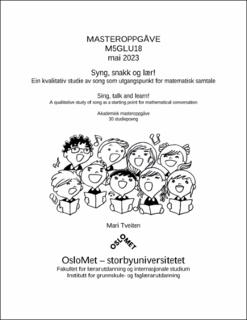| dc.description.abstract | Føremålet med denne masteroppgåva er å undersøke problemstillinga «Korleis kan song vere utgangspunkt for matematiske samtalar på mellom- og ungdomssteget?». Problemstillinga er operasjonalisert til dei følgande forskingsspørsmåla: «Kva var potensialet for matematisk samtale då tre lærarar brukte ein tilrettelagd song i ein matematikktime?» og «Kva syn hadde lærarane på song i matematikkundervisning etter ein gjennomført intervensjon?». Problemstillinga er utforska gjennom intervensjonar i tre ulike klasserom på 7. og 9. steget, der ein gitt, tilrettelagd song med matematisk tekst, utforma av forskaren vart brukt i matematikkundervisning. Det empiriske materialet er samla inn gjennom observasjon av dei tre undervisningsøktene og intervju med lærarane i etterkant. Som eit teoretisk rammeverk rundt oppgåva ligg Teaching for robust understanding (TRU-rammeverket), utvikla av Alan Schoenfeld og kollegaar. Oppgåva bruker òg legitimeringsteoriar av blant anna Varkøy (2015), og bruker Læreplanen for Kunnskapsløftet 2020 (LK20) for å argumentere for relevans og legitimitet av forskingsprosjektet. Tidlegare forsking på song i matematikkundervisning ligg òg til grunn for oppgåva. Gjennom analysar av datamaterialet viser resultata at lærarars matematikksyn og planlagde mål med songen kan påverke i kva grad songen vert brukt til samtale. Funna frå analysen viser at lærarane ser på song i matematikkundervisning som ein hugseregel, ei oppleving som speler på fleire sansar og ein fellesskapsdannande aktivitet. Analysen viser vidare at lærarane hevdar at tidspunkt i ein temaperiode, alder og klassemiljø er faktorar som kan påverke potensialet til matematisk samtale gjennom song.
The purpose of this master ́s thesis is to investigate the issue: «How can song be a starting point for mathematical conversations in 5th to 10th grade?». The research question has been operationalized to the following sub-research questions: «What was the potential for mathematical conversation when three teachers used a specially written song in a mathematics lesson?» and «What view did the teachers have on song in mathematics education after a completed intervention?». The research questions are explored through interventions in three different classrooms at 7th and 9th grade, where a given and specially written song with mathematical lyrics, designed by the researcher, was used in the mathematics education. The empirical material has been collected through observations of the three teaching sequences and interviews with the teachers after the interventions. As a theoretical framework around the paper lies Teaching for robust understanding (the TRU framework), developed by Alan Schoenfeld and colleagues. The paper also uses theories of legitimization by among others Varkøy (2015) and uses the Norwegian national curriculum «Læreplanverket for Kunnskapsløftet 2020» (LK20) to argue for the relevance and legitimacy of the research project. Former research on song in mathematics education is also fundamental to the project. Through analyses of the empirical material, the results show that the teachers ́ view of mathematics and planned purposes of the song, can affect to which extent the song is used in conversation. The findings from the analysis show that the teachers viewed song in mathematics education as a tool for memorization, a sensory experience, and a community-building activity. The analysis further shows that the teachers claimed that the point of time in a thematic teaching sequence, age and classroom environment are factors that can affect the potential of mathematical conversation through song. | en_US |
